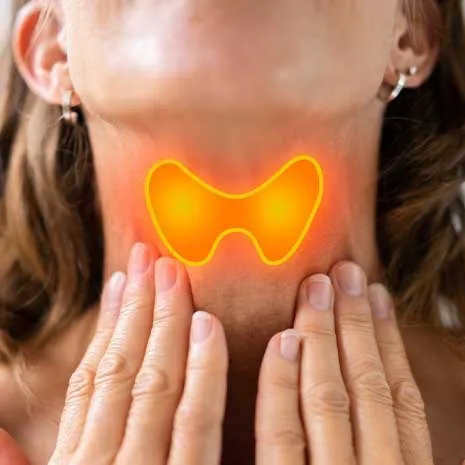The Relationship Between Vitiligo and Thyroid Disorders

The Relationship Between Vitiligo and Thyroid Disorders
- 14 August 2025
- 166

A Shared Autoimmune Ground: Vitiligo and Thyroid Disease
Vitiligo is an autoimmune condition where the body’s immune system attacks melanocytes—the cells responsible for skin pigment. Similarly, most thyroid disorders with autoimmune origins, such as Hashimoto’s thyroiditis and Graves’ disease, involve the immune system mistakenly targeting thyroid cells.
Studies suggest that individuals with vitiligo are at higher risk of developing thyroid dysfunction, especially autoimmune thyroid diseases.
Scientific Evidence: How Strong Is the Connection?
Multiple studies have shown that thyroid dysfunction is significantly more prevalent in people with vitiligo compared to the general population.
Key findings:
- 20–30% of vitiligo patients test positive for thyroid autoantibodies (anti-TPO, anti-TG).
- Hashimoto’s thyroiditis is the most commonly associated condition.
- Female vitiligo patients have a higher risk of thyroid problems than males.
- The risk increases if there is a family history of thyroid disorders.
Which Thyroid Disorders Are Commonly Linked to Vitiligo?
1. Hashimoto’s Thyroiditis (Chronic Autoimmune Thyroiditis)
- Leads to hypothyroidism (underactive thyroid)
- Associated with high levels of anti-TPO and anti-TG antibodies
- Strongest known thyroid link to vitiligo
2. Graves’ Disease
- Causes hyperthyroidism (overactive thyroid)
- Associated with TSH receptor antibodies (TRAb)
- Less common but still possible in vitiligo patients
3. Subclinical Thyroid Dysfunction
- No visible symptoms, but lab abnormalities exist
- Often goes unnoticed unless screened
Why Do These Conditions Coexist?
Both vitiligo and autoimmune thyroid diseases involve immune system dysregulation—specifically, a loss of tolerance to the body’s own cells.
Possible shared mechanisms include:
- Genetic predisposition (e.g., HLA genes)
- Impaired regulatory T-cell function
- Common cytokine imbalances
- Overlapping autoimmune family histories
Vitiligo is considered a clinical marker for autoimmune vulnerability, including thyroid disease.
Should Vitiligo Patients Be Screened for Thyroid Problems?
Yes—thyroid screening is highly recommended, especially in:
- Female patients
- Those with a family history of thyroid disorders
- Patients with symptoms like fatigue, weight changes, or neck swelling
- Children or teens with early-onset vitiligo
- Progressive or widespread vitiligo cases
Recommended Tests for Thyroid Function in Vitiligo Patients
|
Test |
Measures |
Purpose |
|
TSH |
Thyroid-stimulating hormone |
First-line screening test |
|
Free T3 / Free T4 |
Active thyroid hormones |
Assesses thyroid function |
|
Anti-TPO |
Thyroid peroxidase antibody |
Marker of Hashimoto’s disease |
|
Anti-TG |
Thyroglobulin antibody |
Also used to detect autoimmune thyroiditis |
|
TRAb |
TSH receptor antibody |
Diagnostic for Graves’ disease |
|
Thyroid ultrasound |
Structural imaging |
Detects nodules or inflammation |
How Does Thyroid Dysfunction Affect Vitiligo?
Untreated thyroid disorders—especially hypothyroidism—can influence vitiligo by:
- Reducing treatment response, particularly to phototherapy
- Slowing skin cell regeneration and pigment production
- Increasing skin dryness and sensitivity
Treating thyroid imbalance often helps stabilize vitiligo and enhance therapeutic outcomes.
Frequently Asked Questions
No, but both share autoimmune mechanisms and may occur together due to underlying immune dysfunction.
Yes—especially if they have symptoms or risk factors. Routine screening helps detect problems early.
Yes. Immune imbalance from thyroid dysfunction may trigger or accelerate vitiligo in susceptible individuals.
Yes. With proper medical management, both vitiligo and thyroid issues can be controlled effectively.
Not directly, but they help regulate the immune system, which may indirectly reduce vitiligo flare-ups or improve treatment success.
